Tag Archives: Great Barrier Reef
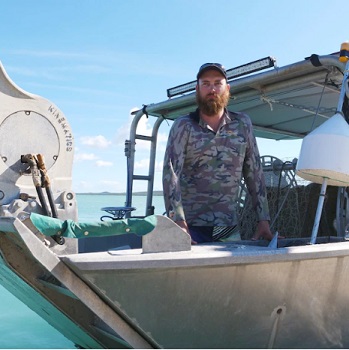
Commercial fishers fear gillnet ban on Great Barrier Reef will destroy business, communities
“I’ve got an 18 month-old daughter and I don’t know how I’ll provide for her at the end of the year,” Mr Waldon said. The third-generation commercial fisherman runs a large gillnetting operation near Marlborough off the central Queensland coast and spends long hours at sea catching fish, such as barramundi and threadfin, to provide for his young family. But with a recently announced ban on gillnet fishing, he feared he would not be able to earn a living anymore. “We’ve got all our life savings tied up in fishing licences, quotas, boats and it’s all rendered completely useless … it’s scary,” Mr Waldon said. Video, >click to read< 09:52
Share this post
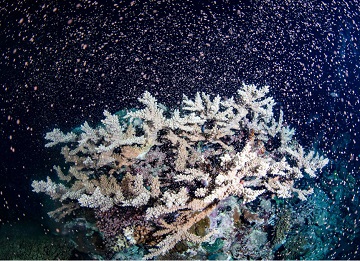
Australia’s Great Barrier Reef erupts in color as corals spawn
Australia’s Great Barrier Reef is spawning in an explosion of color as the World Heritage-listed natural wonder recovers from life-threatening coral bleaching episodes. Scientists on Tuesday night recorded the corals fertilizing billions of offspring by casting sperm and eggs into the Pacific Ocean off the Queensland state coastal city of Cairns. The spawning event lasts for two or three days. The network of 2,500 reefs covering 348,000 square kilometers (134,000 square miles) suffered significantly from coral bleaching caused by unusually warm ocean temperatures in 2016, 2017 and last year. The bleaching damaged two-thirds of the coral. >click to read< 11:13
Share this post
Corals Can Be Saved If We Restore Plankton Cooling
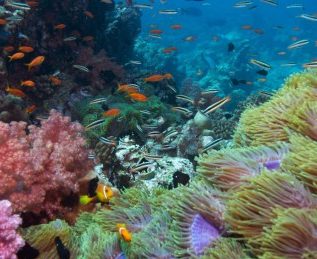 Experts at coral reef conference in Honolulu offer little but the same old career safe ideas. Princely paid pundits prefer pitching party lines about perils to presenting practical prescriptions. Solutions proffered are couched in global warming parlance for the coral reefs those propositions will take decades to make progress and then only at a cost of trillions. Corals will be saved by restoring plankton cooling to stop ocean warming, this will produce positive results for coral reefs in a few years time and will cost mere millions. Scientists at the 13th International Coral Reef Symposium in Honolulu this week are palavering about the latest research on our planet’s imperiled reef. With a little more googling instead of oogling they might quickly discover how the most beautiful bathing beauties at the beach the corals can be saved. Read the article here 17:05
Experts at coral reef conference in Honolulu offer little but the same old career safe ideas. Princely paid pundits prefer pitching party lines about perils to presenting practical prescriptions. Solutions proffered are couched in global warming parlance for the coral reefs those propositions will take decades to make progress and then only at a cost of trillions. Corals will be saved by restoring plankton cooling to stop ocean warming, this will produce positive results for coral reefs in a few years time and will cost mere millions. Scientists at the 13th International Coral Reef Symposium in Honolulu this week are palavering about the latest research on our planet’s imperiled reef. With a little more googling instead of oogling they might quickly discover how the most beautiful bathing beauties at the beach the corals can be saved. Read the article here 17:05
Share this post
The Reef’s Self-Serving Saviours
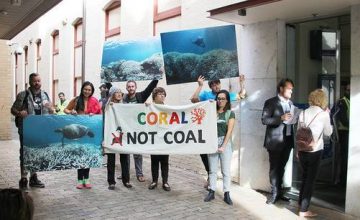 Virtually every year for the past half-century news reports have bannered dire proclamations by “reef experts” on imminent “threats” to the Great Barrier Reef. This has sustained an ongoing, ever-growing charade of “research” and “management” aimed at saving the reef from a litany of hypothetical threats conjured up by a salvation industry which now costs taxpayers over $100 million annually. Although none of these “threats” have ever proven to be anything other than hypothetical possibilities or temporary fluctuations of nature, the doomsters never cease to rummage through their litany of concerns to find something they can present as urgent in order to keep the funding flowing. Please read this. When you do, substitute issues that affect you in your region, ocean acidification, rising oceans, fish surveys that do not resemble what you actually see in your every day world. Ponder why it doesn’t add up. Its about money. Your livelihood being destroyed while others flourish at your expense. Read the article here 20:55
Virtually every year for the past half-century news reports have bannered dire proclamations by “reef experts” on imminent “threats” to the Great Barrier Reef. This has sustained an ongoing, ever-growing charade of “research” and “management” aimed at saving the reef from a litany of hypothetical threats conjured up by a salvation industry which now costs taxpayers over $100 million annually. Although none of these “threats” have ever proven to be anything other than hypothetical possibilities or temporary fluctuations of nature, the doomsters never cease to rummage through their litany of concerns to find something they can present as urgent in order to keep the funding flowing. Please read this. When you do, substitute issues that affect you in your region, ocean acidification, rising oceans, fish surveys that do not resemble what you actually see in your every day world. Ponder why it doesn’t add up. Its about money. Your livelihood being destroyed while others flourish at your expense. Read the article here 20:55
Share this post
Expert: Scientists exaggerated Great Barrier Reef coral bleaching story
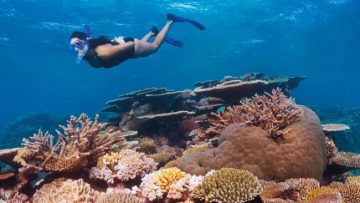 There is growing scientific conflict over bleaching on the Great Barrier Reef. Picture: Tourism Queensland Activist scientists and lobby groups have distorted surveys, maps and data to misrepresent the extent and impact of coral bleaching on the Great Barrier Reef, according to the chairman of the Great Barrier Reef Marine Park Authority, Russell Reichelt. A full survey of the reef released yesterday by the authority and the Australian Institute of Marine Science said 75 per cent of the reef would escape unscathed.,, “We’ve seen headlines stating that 93 per cent of the reef is practically dead,” he said. “We’ve also seen reports that 35 per cent, or even 50 per cent, of the entire reef is now gone. Read the rest here 15:47
There is growing scientific conflict over bleaching on the Great Barrier Reef. Picture: Tourism Queensland Activist scientists and lobby groups have distorted surveys, maps and data to misrepresent the extent and impact of coral bleaching on the Great Barrier Reef, according to the chairman of the Great Barrier Reef Marine Park Authority, Russell Reichelt. A full survey of the reef released yesterday by the authority and the Australian Institute of Marine Science said 75 per cent of the reef would escape unscathed.,, “We’ve seen headlines stating that 93 per cent of the reef is practically dead,” he said. “We’ve also seen reports that 35 per cent, or even 50 per cent, of the entire reef is now gone. Read the rest here 15:47













































